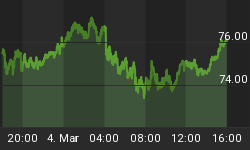The House of Representatives voted 'no' on a $700 billion bailout yesterday and investors reacted by punishing U.S. equities for an estimated $1.2 trillion loss. If you were to ask the average person this morning if purchasing $700 billion in toxic securities to immediately generate $1.2 trillion in stock market wealth sounded like a good idea, many would probably respond 'yes'. This hypothetical aptly demonstrates the mass myth that has been engrained in nearly everyone's psyche over the last two decades - that something, at least on paper, can be produced from nothing...
To begin with, the two key problems with the U.S. financial markets are that they are too large (in relation to both the real economy and common sense), and that they are highly unregulated. Thus, the proposed solution of getting these markets growing again via massive bailout projects is wrongheaded. If you want to avoid the prospect of systemic failure in the future the U.S. markets, specifically the vastly secretive and interconnected derivatives markets, need to be downsized dramatically. This process has slowly been occurring over the last year but has been seriously stymied by repeated attempts to bail the system out. Had a more concerted effort by policy makers early on in this crisis been to forewarn financial market participants that increased transparency and deleveraging were the orders of the day, perhaps we would not have the *quandary we have today.
Next, the problem with the U.S. economy is that it is based upon unsustainable borrowing/debt/asset price manifestations. To highlight the most obvious example, the U.S. consumer saves very little, has a seemingly ever increasing debt profile and, more recently, has relied greatly upon historic stock market and housing market bubbles to keep their wealth expectations abnormally high. In any and every sense, the U.S. consumer is in deep trouble if no major asset class is appreciating on paper or if credit is not becoming more readily available. As for the U.S. government, if studied according to GAAP their balance sheet makes the worst U.S. bank balance sheet look pristine.
Generally speaking, America's current problems started with the closing of the gold window, progressed with the unsustainably of Bretton Woods II, and reached the point of insanity via the complete lack of regulatory oversight that epitomized the Greenspan years. That U.S. financial markets are in a state of panic today is not surprising. That the powers that be have been able to keep the game going this long is.
* The Quandary That Has No Good Answer
While adjustments are required to place the U.S. on a more sustainable trajectory, it is impossible to know whether or not such adjustments would be more beneficial if levied over a period of weeks, months, or years. To use the case of the U.S. housing market and/or the assets related to this market, the answer from policy makers is clearly to string the downward adjustments out over many years. If you ignore the potentially deleterious costs associated with enacting this vision, this plan of attack is promising. After all, the negative feedback loop from crashing home prices and the complete seizure of lending/banking that could result is undesirable, to say the least.
As ridiculous as the opposite notion may sound, perhaps it is better to simply tear it down and start all over again? What should be noted in humoring this theory is that the U.S. economy is still the largest in the world, U.S. debt is denominated in U.S. dollars, and there is currently no serious competitor to USD hegemony. In other words, there remains the possibility that should an 'end game' crisis develop - even if its ignition point was in the U.S. - that the U.S. could play the key role in mapping out tomorrow's new financial order (as an aside, one can only imagine the unmitigated disaster that would be transpiring in the flawed U.S. system if it wasn't such a key player in the global economy today).
Suffice to say, no one denies that financial market adjustments are needed; that greater transparency, less interconnectivity, and smaller derivatives nonsense must come to pass. The quandary is how do you achieve these adjustments if less transparency and a singular connector (i.e. government owns all) are your policy choices? Likewise, it can not be denied that economic adjustments are required; that less reliance on foreign capital and more sustainable consumer/government balance sheet trends are desirable. The quandary here is that even greater reliance on foreign capital is thought to be required over the short term to fund outlays, and the U.S. consumer must keep borrowing/spending so that the U.S. avoids severe recession.
So Many Quandaries So Little Time
While a $700 billion bailout package could well equal a $1.2 trillion increase in stock market wealth, it should be remembered that these numbers say nothing of the value of the dollar compared to goods and services. Following yesterday's 'no' vote the U.S. dollar firmed against many of the majors. Perhaps on the next successful bailout day it declines. And perhaps longer-term if preserving the flawed U.S. financial and economic model are the underlying intent of today's policy efforts, the U.S. dollar fails. How many widgets does $1.2 trillion of dollars in USD stock market wealth purchase?
Adding the dollar quandary to the host of other quandaries dotting the financial escarpment inundates the brain. The human mind, as profound as it is, can not synthesize the most preferred scenarios or concisely map out the desired causal relationships with the quandary-fog layered so thick. So, with common sense beaten senseless the reversion process begins and 20+ years of fond memories flood the sensors tied to emotional responders: scream for the bailout now! Do something else later. Try to forget that a diet consisting of just ice cream eventually produces health problems.















